| dc.contributor.author | Tiberindwa, Zakaria | |
| dc.date.accessioned | 2022-10-31T09:29:51Z | |
| dc.date.available | 2022-10-31T09:29:51Z | |
| dc.date.issued | 2022 | |
| dc.identifier.citation | Tiberindwa, Z. (2022). From food to cash relief: How prepared are Uganda’s anti-corruption agencies to counter corruption in Covid-19 cash transfers?. Journal of Anti-Corruption Law, 6(1), 116-126 | en_US |
| dc.identifier.issn | 2521-5345 | |
| dc.identifier.uri | http://hdl.handle.net/10566/8095 | |
| dc.description.abstract | In July 2021, Uganda commenced the disbursement of telephonic cash transfers to the vulnerable urban poor, most adversely affected by the COVID-19 pandemic, marking a policy shift from food relief to cash transfers to the vulnerable. Accountability hurdles had previously beset food relief interventions with allegations that the funds meant for food relief had been misappropriated. Some of these allegations led to the arrest of officials from the Office of the Prime Minister by the State House Anti-Corruption Unit. Whereas some of the previous studies have indicated cash transfers by telephone to be less prone to the fraud risks and challenges commonly associated with the bureaucracies of procurement, storage, transportation and distribution of in-kind items, there is also evidence that cash transfers may be susceptible to other risks such as political manipulation, ghost beneficiaries, and kickbacks from the local elites who may seek undue benefit from the cash transfer schemes. | en_US |
| dc.language.iso | en | en_US |
| dc.publisher | University of the Western Cape | en_US |
| dc.subject | Covid-19 | en_US |
| dc.subject | Public health | en_US |
| dc.subject | Anti-corruption | en_US |
| dc.subject | Corruption | en_US |
| dc.subject | Uganda | en_US |
| dc.title | From food to cash relief: How prepared are Uganda’s anti-corruption agencies to counter corruption in Covid-19 cash transfers? | en_US |
| dc.type | Article | en_US |

